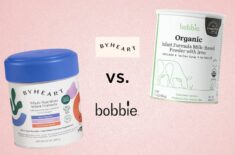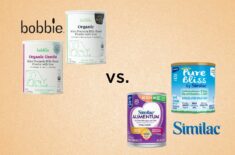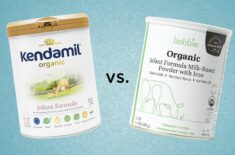Overview
There can be many reasons to love eggs in baby-led weaning. They’re relatively inexpensive and delicious yet packed with nutrients for your child’s growth and development.
Eggs aren’t considered a common choking hazard. Plus, there are plenty of ways to cook eggs for your little one.
Because eggs are one of the top allergenic foods, research shows that early introduction might help reduce the risk of developing an allergy. Clinical trials also show that delayed introduction might contribute to the incidence of allergies. (1)(2)
All these may be reason enough to choose eggs for BLW (baby-led weaning), mama.
But be sure to consult with your pediatrician before introducing your child to eggs, especially if they have known risk factors for allergies.
Introducing eggs to your baby can be tricky, and you might be wondering when’s the best time to do it.
Can you serve whole eggs to your child? What baby-led weaning recipes are easy to make? What allergic reactions should you look out for after feeding your baby eggs for the first time? Find out below.
Top Reasons To Serve Eggs In BLW
- Relatively affordable
- Easily available
- Packed with nutrients
- Versatile, with lots of favorite ways to cook
Are Eggs Healthy For Babies?
Yes. Eggs are naturally rich in nutrients your baby needs for healthy growth and development.
The US Dietary Guidelines Advisory Committee recommends eggs among the first foods to give your baby. (3)
They list eggs among the most nutrient-dense foods that are rich in minerals, vitamins, and other health-promoting components:
- Proteins (muscle development and growth)
- Selenium (for protection from infection and the harmful effects of free radicals) (4)
- Phosphorus (for healthy bones and teeth) (5)
- Riboflavin (for growth and function of the cells in your baby’s body) (6)
- Lutein and zeaxanthin (can promote healthy vision) (7)
- Omega-3 fatty acids (for eye, nerve, and brain development) (8)
- Choline (for brain and eye development) (9)
- Iodine (for proper bone and brain development) (10)
- Vitamins A and B12 (for healthy blood, nerve cells, vision, and immune system) (11)(12)
- Vitamin D (for building and growing bones) (13)
The egg yolks and whites have a different set of nutrients, so it’s a good idea to include both in your child’s diet.
But consult with your pediatrician before introducing your child to eggs (a common allergen), especially if they have risk factors for allergies.
Food Safety With Eggs
Can A Baby Choke On Scrambled Eggs?
Yes, they still can. Though eggs aren’t considered a common choking hazard, any food can potentially become one for different reasons.
So, ensure that you cut up scrambled eggs or any other cooked egg dish into smaller pieces that your child can self-feed and handle for their age.
You can prepare them soft and easy to chew, but not runny or half-cooked.
Also, ensure that you’re closely watching your baby throughout the meal to assist in case they’re choking.
Salmonella Risk
Salmonella infection or salmonellosis is a serious condition that causes diarrhea, fever, vomiting, and stomach cramps in affected individuals. (14)
It’s caused by Salmonella, a bacteria commonly found in many foods, including eggs.
According to the CDC (Centers for Disease Control and Prevention), Salmonella causes around 1.35 million infections in the US every year. (14)
Some people, especially children below five years of age, may be more likely to develop a serious illness from Salmonella. (15)
You can’t see Salmonella. Worse, eggs that look perfect or normal outside might actually harbor this deadly bacteria. (14)
According to the CDC, the only way you can make sure that the egg is safe for your child to eat is for you to cook it properly. (15)
They recommend following these safety guidelines to reduce the risk of Salmonella infection:
- Never give raw, runny, lightly cooked, or half-cooked eggs to your baby.
- Discard dirty or cracked eggs.
- Promptly serve cooked eggs to your baby. Refrigerate immediately if your baby isn’t ready to eat yet.
- Don’t keep eggs or any egg dish at room temperature for more than two hours.
- Avoid giving your child foods cooked or prepared with raw or lightly cooked eggs: examples are Caesar salad dressing, tiramisu, and hollandaise sauce.
- Don’t let your child taste or eat cookie dough, cake mix, or any raw batter or dough.
When To See A Doctor
If your child shows the following symptoms, bring your child to their doctor or the ER:
- Bloody stools
- Diarrhea that lasts for over a day
- Frequent vomiting in 12 hours for infants, one day for a child up to two years old, and two days for older children
- Fever higher than 102˚F
- Signs of dehydration (crying without tears, dry tongue or mouth, and not urinating in three hours or more)
Is It OK To Give Baby Eggs Every Day?
Technically, yes. Eggs are among the healthiest foods that you can give your baby. They’re an easy-to-prepare meal that’s packed with key nutrients your child needs for optimal growth. (3)
Studies show that daily consumption of eggs (one whole egg per day) may not increase the risk of developing cardiovascular disease. These studies suggest that it might even lower heart disease risks. (16)(17)
So, you can let your baby eat an egg per day, though they are likely to consume just around a quarter or half an egg per meal. But some kids might consume an entire egg (make sure it’s cut into pieces).
Please check with your pediatrician if you’re planning to give your child eggs every day.
There may be no specific guidelines to the maximum number of eggs that your baby can eat per week, but it’s also important to provide your baby with food variety. (18)
So, don’t just focus on feeding them eggs. Your child needs other kinds of food and nutrients, too. They might be too full on the egg to try other foods.
Eggs & Cholesterol
Eggs naturally have a high level of cholesterol. But studies show that the cholesterol in eggs may not affect blood cholesterol levels, even in those who consume eggs every day. (16)(17)(19)
Are Eggs A Common Food Allergen?
Yes. Eggs are among the top food allergens, especially for children. (20)
The ACAAI (American College of Allergy, Asthma and Immunology) estimates that as many as 2% of children might be allergic to eggs. (20)
Those with allergies to chicken eggs might also react to other egg types, including duck, goose, or quail eggs. (20)
Can Babies Outgrow Egg Allergy?
Around 70% of children with an egg allergy outgrow it by 16 years of age, according to the ACAAI. (20)
Does My Baby Have An Egg Allergy?
Symptoms of egg allergy can include the following: (20)
- Hives
- Itching
- Swelling (may affect tongue and/or lips)
- Sneezing
- Wheezing
- Nausea
- Stomach cramps
- Indigestion
- Diarrhea
- Repetitive cough
A severe allergic reaction can cause: (20)
- Weak pulse
- Pale or blue coloring of the skin
- Dizziness
- Confusion
- Throat tightness
- Hoarse voice
- Trouble swallowing
- Trouble breathing or shortness of breath
Can My Baby Avoid Getting Egg Allergy?
Clinical trials show that introducing eggs and other common allergens to six-month-old babies can help them avoid developing food allergies. (1)(2)
Studies also show that delayed introduction, based on previous recommendations, might contribute to allergic diseases. However, experts don’t recommend introducing eggs before your baby is four months old. (1)(2)
But ensure that you consult with your pediatrician before introducing your child to eggs, especially if they have risk factors for allergies.
How Do I Overcome My Baby’s Egg Allergy?
If your baby has an egg allergy, talk to their pediatrician to create an action plan in case they accidentally ate eggs or egg-containing foods.
Some essential oils, such as lavender or chamomile, can help provide relief from certain allergy symptoms.
Antihistamines can also help reduce the symptoms of a mild allergic reaction. But epinephrine shots might be needed for a severe case. (21)
Please check with your pediatrician before taking any home interventions.
How Long Does It Take For An Egg Allergy To Show?
Children react to allergens differently.
For some babies, egg allergy symptoms can develop within just a few minutes, but it might also take up to around 72 hours to show. (22)
What’s An Egg Intolerance?
An egg intolerance is a digestive response to eggs rather than an immune reaction, such as what’s experienced with allergies. (23)
What Are The Symptoms Of An Egg Intolerance?
It can cause digestive symptoms similar to an allergic reaction, but it isn’t life-threatening and doesn’t cause breathing difficulties.
Symptoms of egg intolerance can include: (23)
- Stomach ache
- Nausea
- Vomiting
- Diarrhea
Seek medical attention if your baby continues to vomit or experience diarrhea for over 12 hours.
When Can Babies Eat Eggs?
The US Dietary Guidelines Advisory Committee recommends providing your child with nutrient-dense complementary foods, such as eggs, when they’re around six months old. (3)
But because children develop at a different rate, some might already be ready for solid foods at four months of age.
These are some common signs that your child may be ready for solid foods:
- Sits up (alone or with support)
- Can control head and neck
- Opens mouth when offered with food
- Swallows food (doesn’t automatically push it out of their mouth)
- Can bring objects to their mouth
- Tries to grasp objects, such as toys or food
Can I Feed My 6-Month-Old Eggs?
Yes. But understand that babies develop differently. While some might already show readiness for solid foods at four months of age, others might not be ready even at six months.
As long as they’re showing signs of readiness for solid foods, you can give them eggs. (3)
But always ensure you consult a pediatric health professional, registered dietitian, nutritionist or, expert in pediatric feeding before feeding your baby egg for their first solid foods.
How Do You Serve Eggs For Baby-Led Weaning?
Eggs are versatile foods that you can cook and serve in different ways in BLW. They aren’t considered a common choking hazard, but you still have to ensure that these are prepared in the safest way possible.
- Eggs are best served as finger foods in baby-led weaning.
- Make sure they’re cut appropriately, according to your child’s age or developmental stage.
- Don’t let your child eat raw or half-cooked eggs to avoid the risks of food-borne illnesses.
- If you’d like to use eggs as a dip for your baby’s finger foods, you can add them to yogurt, mashed avocado, or hummus.
How Do I Introduce Eggs To My 6-Month-Old According to BLW?
Check with your child’s pediatrician before introducing them to eggs.
If your little one shows all the signs of readiness at this age, you can serve them eggs cooked with the simplest recipes.
It’s essential not to overwhelm your baby with many different flavors in one particular food.
These can be ways to serve them with eggs:
- Omelet or scrambled eggs cut in rectangular strips
- Hard-boiled eggs, quartered
Hard-boiled eggs might be difficult to pick up, especially because the yolk can crumble in their palm with too much pressure.
If they can’t grasp the food or put it in their mouth, that’s fine.
Don’t try to “help” your baby get any food in their hands. Remember that in BLW, your child is in control. Trust your child to learn how their body parts work together to eat.
According to baby-led weaning pioneer Dr. Gill Rapley, your child didn’t “fail” just because they couldn’t put the food in their mouth. Instead, they’re probably not ready for food yet. (24)
She adds that trying to “help” them overcome this perceived “failure” can be dangerous. Always let your child do it their way.
How Do I Introduce Eggs To My 7 Month Old?
You can give them omelet strips or quartered hard-boiled eggs, but you can begin preparing foods with different textures and flavors.
For example, if you can give them omelets that have veggies.
You can also try adding some ground meat to your baby’s omelet. Meat is great because it’s also a rich source of protein and iron.
But be careful with these foods because your child might bite off a big chunk, leading to choking risks. Instead, cut them to manageable, bite-sized pieces.
Kids develop at different rates, so some 7-month-old kids might not be ready for weaning. This is especially true with babies born prematurely. You might have to wait until they’re around six or seven months from their due date.
Giving eggs and other solid foods to infants who aren’t ready can increase their risk of choking. So, always check for signs of readiness, especially sitting up and swallowing, before introducing your child to solid foods like eggs.
With your pediatrician’s approval, you can start giving eggs if your 7-month old child appears ready.
Introducing Eggs To Kids Eight Months Old And Above
Many children this age are already developmentally ready for smaller foods. They can use their thumb and index finger to hold their food. It’s called “pincer grasp.”
But eggs aren’t usually served in small bits and pieces.
If it’s your first time introducing them to this food, you can still opt for a simple meal, such as hard-boiled or scrambled eggs.
You can also opt to make variations to your egg recipes to create new flavors for your child to try.
So, you might offer them multi-ingredient foods like the following:
- Veggie quinoa egg muffins
- Egg pancakes
- Egg rolls
- Toast with eggs
- Frittatas
- Egg salad
- Egg and spinach cups
But it doesn’t have to be fancy.
Just remember to introduce one allergen at a time, especially top ones like eggs, peanuts, soy, dairy, tree nuts, wheat/gluten, and seafood. This way, you can track what can trigger an allergic reaction with your child.
Eggs For 12 Months Old And Above
By the time they’re 12 months old, most babies might be ready to enjoy most meals that you can eat. You can give them any of the egg meals listed above for the younger age groups.
But for fun explorations and to let them try something new, you can also cut up cooked eggs (for example, scrambled or omelet) into small shapes. It can help them practice using dining utensils.
Can You Serve Whole Eggs To Your Child?
Yes. Whole eggs are a nutrient-dense food recommended by nutrition experts for children and adults alike. They’re even recommended as one of the first foods to give your child. (3)
But like other foods, make sure you check for choking hazards before giving them to your baby. You can cut it up into sizes appropriate to their age.
Many pediatricians recommend introducing your baby to hard-boiled eggs one part at a time.
The yolk part is creamier and can be easier for your child to like. Plus, the white part might be more likely to trigger an allergic reaction.
Though it might be alright to let them eat an entire egg, you can try serving the creamier yolk first on their first day with this food item. Cut it up into smaller pieces before giving them to your baby.
On their next meal or the next day, perhaps you can try giving them egg whites cut into strips. Then, try a combination the following day.
But ensure that you check with your pediatrician before giving eggs to your baby for the first time.
Other Foods To Serve With Eggs in BLW
Eggs are so versatile that you can serve them with many different foods.
You can serve eggs as a main dish or a dip, but you can also prepare it with:
- Meat (ground, minced, or thin slices)
- Vegetables (potatoes, mushrooms, carrots, spinach, leeks, asparagus, etc.)
- Herbs (basil, parsley, tarragon, chives, thyme, etc.)
- Spices (onions, mild paprika, curry powder, cumin, etc.)
- Grains
- Bread
According to the AAP (American Academy of Pediatrics), there’s no specific order for you to introduce food to your child. (25)
But you have to make sure that you’re providing them with different foods to meet various nutritional needs. Serving eggs with these other food varieties can help you achieve that.
4 Easy Egg Recipes To Try
Simple Hard-Boiled Egg
Ingredients
- One large egg
Preparation Instructions
- Put the egg in a small pot.
- Add some water. Boil.
- Set the timer to 8-10 minutes once the water is boiling.
- Remove from heat and cool down.
- Peel and cut into strips or pieces appropriate to your baby’s age.
Baby’s First Egg Omelet
Ingredients
- Two eggs
- 2 tbsp water
- 2 tbsp coconut oil
- 2 tbsp pre-cooked veggie or meat strips
Preparation Instructions
- Crack the eggs, add the water, and whisk in a small bowl.
- Pour the oil into a pan and heat (medium fire).
- Add the egg mixture into the pan.
- Turn down heat to medium-low.
- Once the mixture sets, you can add the pre-cooked meat or veggies on one side.
- Fold the egg with a spatula.
- You can also flip it to cook the other side.
- Cool and cut into strips.
Another option is to cook the egg without the veggies or meat, then just serve them together on your baby’s food tray.
Egg And Avocado On Toast
Avocado is another great option as a first food for baby-led weaning.
Ingredients
- One hard-boiled egg, peeled
- One half of a ripe avocado
- Bread slices (opt for bread that’s free from gluten, nuts, sugar, or honey)
Preparation Instructions
- Scoop the avocado.
- Place it in a small bowl.
- Mash it.
- Do the same thing to a hard-boiled egg.
- Get a slice of bread.
- Spread the mashed avocado and egg.
- Toast.
Ensure that the toast has cooled down before giving it to your child.
You can also use other toppings to mix with your egg toast, including fruit or vegetable purées.
Egg And Spinach Cups
Ingredients
- Six eggs
- 2 oz milk (breast milk or formula, but exclude if your baby has dairy allergies)
- 1 tsp coconut oil
- A handful of spinach
- Six cherry tomatoes or one regular tomato
- One red bell pepper, minced
Preparation Instructions
- Preheat the oven to 350 degrees Fahrenheit.
- Whisk together the milk and eggs until fluffy.
- Sprinkle the muffin tin with oil.
- Pour in your egg mixture, filling half of each section.
- Chop the spinach, tomatoes, and bell pepper.
- Arrange the chopped veggies in the muffin pan.
- Bake for 25 minutes.
- Cool before serving.
You can also add cheese or other toppings.
Serve one or two cups of this dish to your baby. Put the rest in an airtight container and store in the fridge. Egg dishes can last 3-4 days in the fridge. (26)
Simply pop them in the oven to reheat for an easy breakfast and snack.
REFERENCES
(1) https://www.ncbi.nlm.nih.gov/pmc/articles/PMC4046529/
(2) https://pubmed.ncbi.nlm.nih.gov/20920771/
(3) https://www.dietaryguidelines.gov/sites/default/files/2020-12/Dietary_Guidelines_for_Americans_2020-2025.pdf
(4) https://ods.od.nih.gov/factsheets/Selenium-HealthProfessional/
(5) https://ods.od.nih.gov/factsheets/Phosphorus-Consumer/
(6) https://ods.od.nih.gov/factsheets/Riboflavin-Consumer/
(7) https://www.ncbi.nlm.nih.gov/pmc/articles/PMC5331551/
(8) https://www.ncbi.nlm.nih.gov/pmc/articles/PMC4404917/
(9) https://www.ncbi.nlm.nih.gov/pmc/articles/PMC6566660/
(10) https://ods.od.nih.gov/factsheets/Iodine-Consumer/
(11) https://ods.od.nih.gov/factsheets/VitaminA-Consumer/
(12) https://ods.od.nih.gov/factsheets/VitaminB12-Consumer/
(13) https://www.mayoclinic.org/drugs-supplements-vitamin-d/art-20363792
(14) https://www.cdc.gov/salmonella/
(15) https://www.cdc.gov/foodsafety/communication/salmonella-and-eggs.html
(16) https://www.ncbi.nlm.nih.gov/pmc/articles/PMC7190072/
(17) https://www.ncbi.nlm.nih.gov/pmc/articles/PMC4586539/
(18) https://www.nhs.uk/live-well/eat-well/eggs-nutrition/
(19) https://www.ncbi.nlm.nih.gov/pmc/articles/PMC6165023/
(20) https://acaai.org/allergies/allergic-conditions/food/egg/
(21) https://www.mayoclinic.org/diseases-conditions/egg-allergy/diagnosis-treatment/drc-20372119
(22) https://www.unlockfood.ca/en/Articles/Allergies-and-Intolerances/What-Do-I-Need-to-Know-About-Egg-Allergies.aspx
(23) https://universityhealthnews.com/daily/gluten-free-food-allergies/egg-intolerance-symptoms-treatment/
(24) http://www.rapleyweaning.com/assets/How_early_is_too_early.pdf
(25) https://www.cdc.gov/nutrition/infantandtoddlernutrition/foods-and-drinks/when-to-introduce-solid-foods.html
(26) https://www.fda.gov/food/buy-store-serve-safe-food/what-you-need-know-about-egg-safety












